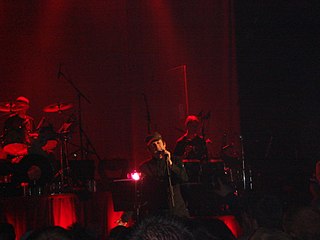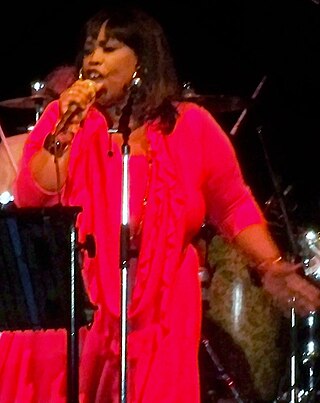
The Electric Light Orchestra (ELO) are an English rock band formed in Birmingham in 1970 by multi-instrumentalists Jeff Lynne and Roy Wood and drummer Bev Bevan. Their music is characterised by a fusion of pop and classical arrangements with futuristic iconography. After Wood's departure in 1972, Lynne became the band's sole leader, arranging and producing every album while writing nearly all of their original material. During their first run from 1970 to 1986, Lynne and Bevan were the group's only consistent members.

Jeffrey Lynne is an English musician, singer-songwriter and record producer. He is the co-founder, and latterly the sole member of the rock band Electric Light Orchestra (ELO), which was formed in 1970, and has written all of the band's music since 1972. This includes hits such as "Evil Woman", "Livin' Thing", "Telephone Line", "Mr. Blue Sky", "Don't Bring Me Down", and "Hold On Tight". He also has had a solo career, with two albums: Armchair Theatre (1990) and Long Wave (2012).

James William Somerville is a Scottish singer who rose to prominence in the 1980s with the synth-pop groups Bronski Beat and the Communards. With Bronski Beat, Somerville achieved commercial success with the 1984 single "Smalltown Boy" which reached the top spot in Belgium, Italy, the Netherlands and the US Hot Dance Club Play. Additionally, it reached the top five in the United Kingdom, West Germany, Ireland and New Zealand as well as charting within the US Billboard Hot 100. Bronski Beat's debut album The Age of Consent (1984) was the only release Somerville contributed to as lead vocalist before leaving the band in 1985 and joining The Communards.

Stephen Lawrence Winwood is an English musician and songwriter whose genres include blue-eyed soul, rhythm and blues, blues rock, and pop rock. Though primarily a guitarist, keyboard player, and vocalist prominent for his distinctive soulful high tenor voice, Winwood plays other instruments proficiently, including drums, mandolin, bass, and saxophone.

The Brand New Heavies are an English band formed in 1985, consisting of Simon Bartholomew, Andrew Levy, and Jan Kincaid. After the addition of N'Dea Davenport in 1990, the group experienced mainstream success and pioneered a new genre called acid jazz.

Madchester was a musical and cultural scene that emerged in the English city of Manchester during the late 1980s, closely associated with the indie dance movement. Indie dance blended indie rock with elements of acid house, psychedelia, and 1960s pop.

UB40 are an English reggae and pop band, formed in December 1978 in Birmingham, England. The band has had more than 50 singles in the UK Singles Chart and has also achieved considerable international success. They have been nominated for the Grammy Award for Best Reggae Album four times and were nominated for the Brit Award for Best British Group in 1984. UB40 have sold more than 70 million records worldwide. The ethnic make-up of the band's original line-up was diverse, with musicians of English, Welsh, Irish, Jamaican, Scottish, and Yemeni parentage.

The Beautiful South were an English pop rock group formed in 1988 by Paul Heaton and Dave Hemingway, two former members of the Hull group the Housemartins, both of whom performed lead and backing vocals. Other members throughout the band's existence were former Housemartins roadie Sean Welch (bass), Dave Stead (drums), and Dave Rotheray (guitar). The band's original material was written by Heaton and Rotheray.

The Charlatans are an English rock band formed in Birmingham, West Midlands in 1988. As of 2000, the band’s line-up consists of lead vocalist Tim Burgess, guitarist Mark Collins, bassist Martin Blunt, and keyboardist Tony Rogers.

Travis are a Scottish rock band formed in Glasgow in 1990, and composed of Fran Healy, Dougie Payne, Andy Dunlop, and Neil Primrose. The band's name comes from the character Travis Henderson from the film Paris, Texas (1984). The band released their debut album, Good Feeling (1997), to moderate success where it debuted at number nine on the UK Albums Chart and was later awarded a silver certification from the British Phonographic Industry (BPI) in January 2000.

Take That are an English pop group formed in Manchester in 1990. The group currently consists of Gary Barlow, Howard Donald and Mark Owen. The original line-up also featured Jason Orange and Robbie Williams. Barlow is the group's lead singer and primary songwriter, with Owen and Williams initially providing backing vocals, and Donald and Orange serving primarily as dancers.

Musical Youth are a British reggae band formed in 1979 in Birmingham, England. They are best remembered for their 1982 single "Pass the Dutchie", which was a number 1 in multiple charts around the world. Their other hits include "Youth of Today", "Never Gonna Give You Up", and a collaboration with Donna Summer, "Unconditional Love". Musical Youth recorded two albums and earned a Grammy Award nomination before disbanding in 1985 after a series of personal problems. The band returned in 2001 as a duo.

Bentley Rhythm Ace (BRA) are a British electronic music act formed in Birmingham in 1995, originally consisting of Mike Stokes and Richard March.

Pop Will Eat Itself are an English alternative rock band formed in 1986 in Stourbridge in the West Midlands of England with members from Birmingham, Coventry and the Black Country. Initially known as a grebo act, they changed style to incorporate sample-driven indie and industrial rock. Graham Crabb describes their sound as "electronic, punk, alternative hip-hop, hybrid music for fucking, fighting & smoking cigars". Their highest-charting single was the 1993 top-ten hit "Get the Girl! Kill the Baddies!". After initially disbanding in 1996, and having a brief reformation in 2005, they issued their first release in more than five years in 2010.
Billie Ray Martin is a German singer and songwriter, known for her single "Your Loving Arms", which reached the top 10 of both the UK singles chart (#6) and the Irish Singles Chart (#8) in 1995, and reached number one on the US Dance Club Chart. She was also one of the vocalists on the S'Express UK top 10 hit single "Hey Music Lover" (1989), and had UK top 40 hits as lead vocalist of Electribe 101 with "Tell Me When the Fever Ended" (1989) and "Talking with Myself" (1990), and as a solo singer with "Running Around Town" (1995) and "Imitation of Life" (1996).

The Farm are a British band from Liverpool. Their first album, Spartacus, reached the top position on the UK Albums Chart when it was released in March 1991; Spartacus 30 was released in 2021 to commemorate the anniversary. Spartacus includes two songs which had been top 10 singles the year before. In 2012, they toured with their Spartacus Live shows and formed part of the Justice Tonight Band, supporting the Stone Roses at Heaton Park, Phoenix Park, Lyon and Milan. They formed part of The Justice Collective which had the 2012 Christmas number one with their recording of "He Ain't Heavy, He's My Brother".
Five Star were a British pop group, formed in 1983 and comprising siblings Stedman, Lorraine, Denise, Doris, and Delroy Pearson. From 1985 to 1988, Five Star had four top-20 albums and 15 top-40 singles in the UK, including the top-10 hits "System Addict" (1986), "Can't Wait Another Minute" (1986), "Find the Time" (1986), "Rain or Shine" (1986), "Stay Out of My Life" (1987) and "The Slightest Touch" (1987). They won the 1987 Brit Award for Best British Group.

Electribe 101 were an English-based group active from 1988 to 1992, playing dark, psychedelic, bluesy, electronic soulful house, and fronted by Billie Ray Martin.

Francella Ruby Turner MBE is a British Jamaican R&B and soul singer, songwriter, and actress.
Birmingham's culture of popular music first developed in the mid-1950s. By the early 1960s the city's music scene had emerged as one of the largest and most vibrant in the country; a "seething cauldron of musical activity", with over 500 bands constantly exchanging members and performing regularly across a well-developed network of venues and promoters. By 1963 the city's music was also already becoming recognised for what would become its defining characteristic: the refusal of its musicians to conform to any single style or genre. Birmingham's tradition of combining a highly collaborative culture with an open acceptance of individualism and experimentation dates back as far back as the 18th century, and musically this has expressed itself in the wide variety of music produced within the city, often by closely related groups of musicians, from the "rampant eclecticism" of the Brum beat era, to the city's "infamously fragmented" post-punk scene, to the "astonishing range" of distinctive and radical electronic music produced in the city from the 1980s to the early 21st century.
















